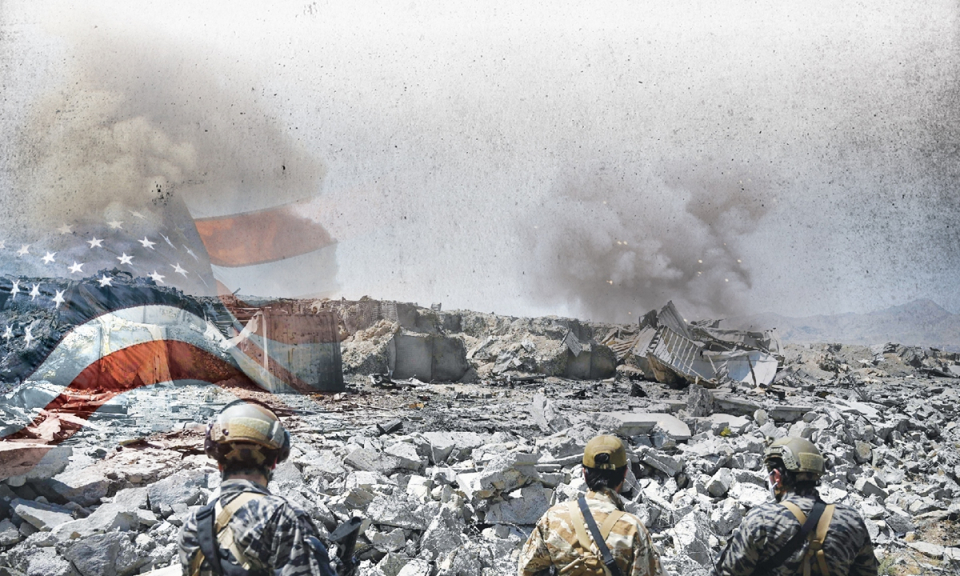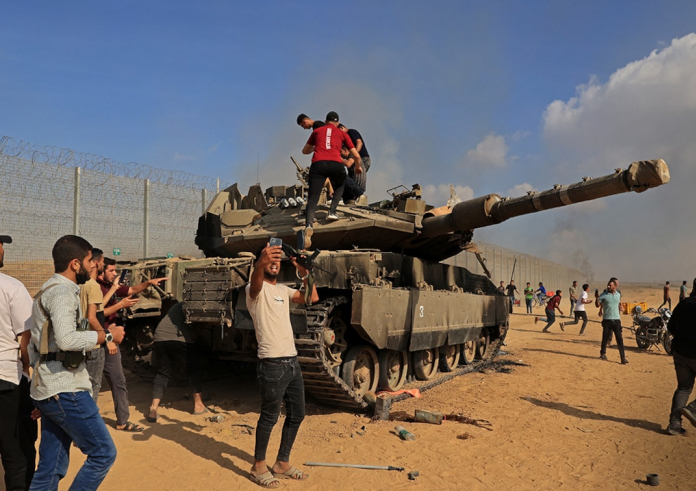By Brian Berletic

With so many countries around the globe still subjected to US influence, either literally occupied by US military forces, or ruled by a government helped into power by significant US assistance (or a combination of the two), and with so many countries the target of possible US-sponsored regime change and interference in contravention of the UN Charter, it is important to take a look at the history of US occupation and the indelible scars it leaves on the countries and their inhabitants even decades after the US finally withdraws.
Left in an American intervention's wake are often sociopolitical rifts that take years if not decades to heal. There is also the economic desolation left behind, forcing a country to rebuild its economy often from the ground up. And in the case of the US leaving a country after a lengthy military conflict, left behind is a landscape littered with unexploded ordnance (UXO) that will take generations to clean up, maiming and killing innocent people until that point in the distant future is reached.
Understanding more fully the long-lasting consequences of US interference, intervention, and occupation in the past may help the world understand better the necessity to speak up, oppose, and prevent this interference, intervention, and military occupation by the US today.
Vietnam: pulverized and poisoned
From 1955 to 1975, the US was engaged in a brutal war in Southeast Asia's Vietnam. The US entered the conflict alongside the French in one of many attempts last century to assist the West in reasserting its colonial rule around the globe after WWII.
Throughout the fighting, the US and its allies killed millions of Vietnamese and destroyed infrastructure and cities across the country. Through the use of the defoliant Agent Orange, the US poisoned both the land and its people, killing those exposed to it then, and leaving a trail of birth defects and cancer cutting through future generations of Vietnamese.
The US bombed Vietnam and its neighbors, Cambodia and Laos, more intensely than anything seen during WWII. Today, UXO kill and maim people across these three countries every year. While the US provides support for clearing UXO, the assistance is token and conditional. At the rate US-funded mine-clearing and UXO disarmament is being done, the problem will remain for many more generations to come.
The irony is that after so much widespread destruction carried out by the US, Vietnam and its neighbors are rebuilding and advancing their nations forward mainly through cooperation with China, a nearby neighbor.
Afghanistan: ravaged and robbed
Another more recent example is Afghanistan. The US occupied Afghanistan for two decades. Despite allocating trillions of dollars in building up Afghanistan's national armed forces, a centralized government, and for "reconstruction," all of the above collapsed almost overnight when the US withdrew its forces in 2021.
Afghans who worked with the US over those two decades ̶ tens of thousands of people ̶, were left behind, just as the US abandoned tens of thousands of Vietnamese during its withdrawal from Southeast Asia in 1975.
Just as was the case with Vietnam, Afghanistan was left without essential infrastructure, or a functioning economy, and with sociopolitical divides that the people of Afghanistan will have to resolve themselves over the next years or even next decades.
In addition to leaving a raft of crises behind, the US ensured Afghanistan would be left without any resources to resolve them. The US froze billions of US dollars' worth of assets belonging to the Afghan central bank, and to this day refuses to release it to the current government of Afghanistan. Because of Washington's persistent influence over international institutions like the United Nations, the current Afghan government is denied recognition and therefore unable to marshal the resources needed to stabilize and rebuild the country after two decades of war under US occupation.
Just as in Southeast Asia, Afghanistan has had thousands of tons of munitions dropped on it. UXO in Afghanistan kills or injures dozens of people each month. Just like Southeast Asia, Afghanistan will suffer the consequences of US occupation for years, hopefully not decades, to come.
A warning to the world
If the consequences of US interference, intervention, and occupation are so drastic, devastating, and long-lasting, why is it that the US is provided so much leeway, benefit of doubt and even outright support from the supposed "international community" each subsequent time it embarks on shaping events thousands of kilometers from its own shores?
Ukraine, as it exists, is a product of US interference stretching back to 1991. A process of dividing the newly independent country after the disintegration of the Soviet Union between East and West culminated in 2014 when the US overthrew the elected government in Kiev and installed one of its choosing.
Since then, Ukraine has irrationally cut political and economic ties with its neighbor Russia, devastating its economy and inhibiting development. The US and other NATO members deliberately pumping weapons and military training into the growing divide ensured the conflict not only began, but continuously escalated.
Today, Ukraine serves as the latest example of Washington's "touch of death," and of the division and destruction that reverberates within and beyond the borders of a country targeted by the US. The US and the collective West in general still possess a powerful grip on international institutions like the United Nations and control over the spread of information worldwide. This enables the US to diminish the voices of reason sounding the alarm of America's interventions today by reminding the world of the consequences of US interventions in the past.
As multipolarism continues to grow and displaces this pre-existing paradigm, perhaps a growing number of platforms hosting these voices of reason can reach critical mass, allowing these warnings to be heard and heeded long before the US is able to create another enduring crisis within the borders of yet another targeted nation.
Source: Global Times

















